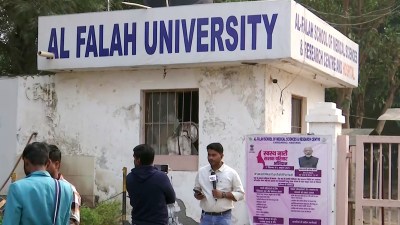Indian condition for Pak talks: Sentencing in 26/11 case
India is unwilling to move forward on any meaningful talks with Pakistan unless the Pakistani legal process against the 26/11 accused delivers some concrete results like sentencing of the suspects....
India is unwilling to move forward on any meaningful talks with Pakistan unless the Pakistani legal process against the 26/11 accused delivers some concrete results like sentencing of the suspects.
This,sources said,flows from a Cabinet decision taken in September and there has been no move to review it.
Its learnt that following this decision,when External Affairs Minister S M Krishna met his Pakistani counterpart Shah Mehmood Qureshi in New York,they agreed to a broad roadmap which included expediting the judicial process in Pakistan towards this objective.
The other element of this was to take action against those behind the Lashkar-e-Toiba as well as its prominent leaders like Hafiz Mohammed Saeed besides shutting down camps.
While there have been some encouraging developments since then on the 26/11 prosecution,India does not believe these are enough and thinks that these seem to be often timed around a multilateral event which raises doubts over Islamabads intent.
Unsure about Pakistans seriousness,the interactions are,therefore,turning cold at events like the ongoing Commonwealth Heads of Government Meet here.
Even though there are a few opportunities for the two leaders to cross paths here,the Indian side has already decided to keep the interaction at a minimal level just like earlier this month when Krishna and Qureshi sat next to each other at the swearing-in of Hamid Karzai as President in Kabul.
The only conversation that happened was on terror and bringing the perpetrators of 26/11 attacks to justice.
A repeat of the same is on the cards in CHOGM,too. More importantly,sources said,the approach is not going to change unless the Cabinet Committee on Security reviews this stand which was decided after the furore over the Sharm-el-Sheikh joint statement.
At the same time,Prime Minister Manmohan Singh has underlined that ties shouldnt slip further by reversing existing exchanges and people-to-people interaction.
While India works hard to keep this tough balance going,sources said,Pakistan has not taken much of an initiative to rebuild trust and confidence.
Sharing details and cooperating directly with India on the Headley-Rana case did present one such opportunity but Pakistan made no gesture leaving New Delhi to depend on information from Washington.
The unpredictable political situation in Pakistan has not helped either with Pakistan President Asif Ali Zardaris detractors using the meeting between him and Singh at Yekaterinberg as an example of the Pakistan leaders inability to make a strong case with India.
On the other hand,the Sharm-el-Sheikh joint statement is being credited as an achievement for Pakistan PM Yousaf Raza Gilani.



- 01
- 02
- 03
- 04
- 05



























